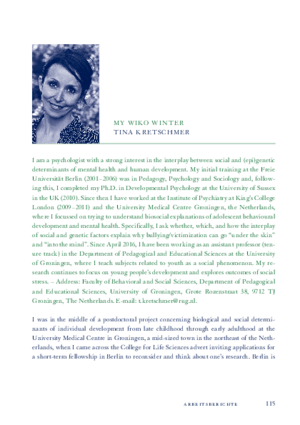
Tina Kretschmer, Ph.D.
Psychology
University of Groningen
University Medical Centre Groningen
Born in 1980 in Elsterwerda, Germany
Studied Education, Psychology and Sociology at the Freie Universität Berlin and Psychology at the University of Sussex
Fellowship
College for Life Sciences
Project
Why Does Peer Victimization Get under the Skin? Exploring Physiological and Epigenetic Pathways
Experiencing peer victimization in childhood and adolescence can have severe negative consequences for psychological, social and behavioural adjustment later on, but our understanding of the biological mechanisms through which this form of social stress gets under the skin needs to be advanced. For instance, individual differences in physiological stress response have been suggested and cortisol baseline levels and variations over the day seem to show non-normative patterns in peer-victimized adolescents. Importantly, individual differences in physiological responses to stress have been implicated in psychopathology. Moreover, epigenetic changes as a result of peer victimization concern DNA methylation and telomere length, both of which have been linked to psychopathology. Thus, a model in which the associations between peer victimization and psychopathology are explained by physiological and epigenetic changes is plausible. So far, findings on this topic appear nonsystematic, which poses a problem for intervention design. In other words, we can prevent young people from developing psychopathology in response to peer victimization only if we have a detailed understanding of the different mechanisms involved. During my stay at the Wissenschaftskolleg, I intend to summarize and systematize these studies to create a stable foundation for future research. As such, my work in Berlin will form the groundwork for a grant application to study in depth the biological pathways from peer victimization to psychopathology.Recommended Reading
Kretschmer, Tina, Jan Kornelis Dijkstra, René Veenstra (2015). "Peer effects and molecular genetics in adolescent antisocial behavior." In The Routledge International Handbook of Biosocial Criminology, edited by M. DeLisi and M. G. Vaughn, 101-115. New York: Routledge, 2015.
Kretschmer, Tina, Edward D. Barker, Jan Kornelis Dijkstra, Albertine J. Oldehinkel and René Veenstra (2015). "Multifinality of peer victimization: maladjustment patterns and transitions from early to mid-adolescence." European Child and Adolescent Psychiatry. doi: 10.1007/s00787-014-0667-z.
Kretschmer, Tina, Jan Kornelis Dijkstra, Johan Ormel, Frank C. Verhulst and René Veenstra (2013). "Dopamine receptor D4 gene moderates the effect of positive and negative peer experiences on later delinquency: The Tracking Adolescents' Individual Lives Survey study." Development and Psychopathology 25, 4: 1107-1117.
Publications from the Fellow Library
Kretschmer, Tina (2016)
What explains correlates of peer victimization? : A systematic review of mediating factors
